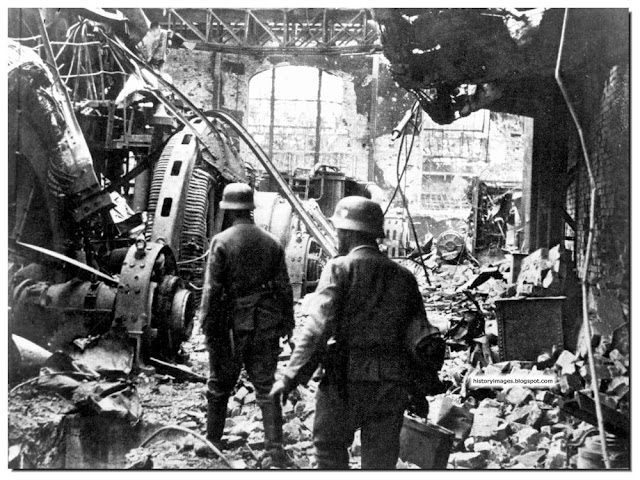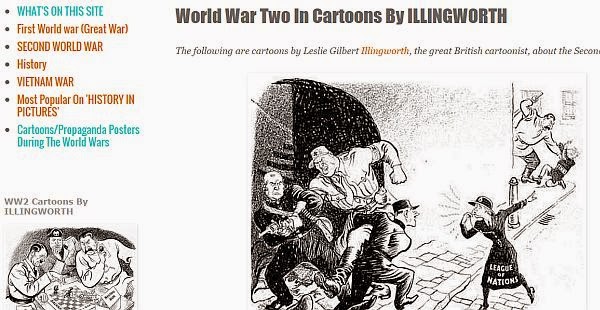Some of the most brutal fighting ever in history in any war took place at Stalingrad.....The images of Stalingrad are fascinating.
Stalingrad was not fought on the Queensberry rules. It was brutal and dehumanising. Here German soldiers have taken a position in a house. The fighting in Stalingrad was house-to-house. Street-by-street. Hell on earth.
A German soldier at Stalingrad in September, 1942.
German soldiers enjoy a smoke near a APC. 1942. Stalingrad

Russians in action
1943. Stalingrad. After the Sixth Army had fallen. Italian POW. Starving, broken, hopeless. And very weary.
(Image: S Alperin) Russian soldiers rest during a rare break in the fighting. The rifle seen is a automatic AVS 36 Soviet rifle. The soldier standing has a anti-tank RPG-40 anti-tank grenade slung around his shoulder.
(Image: Elsner) A wounded German soldier has a smoke with Luftwaffe pilots before being flown to a hospital. A German controlled airfield. Stalingrad. Winter. 1942.
(Image: Kurt Heinke. Copyright-Bundesarchiv) A German lieutenant sits amongst the ruins of s factory in Stalingrad. 1942.
December 1942. Stalingrad. The tough Russian officers who made it possible. (Left to right) Chief of Staff of the 62nd Army Col. NI Krylov, Commander of the 62nd Army, Lieutenant General VI Chuikov, member of the military council of the army, KA Gurov, Col. AI Rodimtsev.
Russian soldiers with an anti-aircraft gun wait for the Luftwaffe bombers
A funeral at Stalingrad. August 1942
A priest conducts a funeral service. Stalingrad. August, 1942.
Late summer. 1942. Stalingrad. Things were good then. Germans enjoy music
Summer 1942. Stalingrad area. A German officer offers his men cigarettes.
Russian soldiers with an anti-aircraft gun wait for the Luftwaffe bombers
A funeral at Stalingrad. August 1942
A priest conducts a funeral service. Stalingrad. August, 1942.
Late summer. 1942. Stalingrad. Things were good then. Germans enjoy music
Summer 1942. Stalingrad area. A German officer offers his men cigarettes.
 Initially the German soldiers were optimistic and full of motivation. But it gradually petered out.
Initially the German soldiers were optimistic and full of motivation. But it gradually petered out.SURRENDER AT STALINGRAD AS REPORTED BY BBC - FEB 2, 1943
The Soviet Government has announced the final defeat of the German 6th Army at the port of Stalingrad, in southern Russia.
A statement late this evening said: "Our forces have now completed the liquidation of the German Fascist troops encircled in the area of Stalingrad.
"The last centre of enemy resistance in the Stalingrad area has thus been crushed."
The declaration brings to an end five months of heavy fighting for the city. The battle has been described as among the most terrible of the war so far.
Another 45,000 German soldiers have been taken prisoner in the last two days, bringing the total in custody to over 90,000 officers and men.
The prisoners are understood to be in an appalling condition after enduring months of starvation in temperatures down to -30°C.
They are the remains of the 330,000-strong German force sent to take Stalingrad.
The rest - about a quarter of a million men - have died, as many from illness, starvation and frostbite as from the fighting itself.
The 6th Army has been trapped inside the city, completely surrounded by the Red Army, for almost three months during the harshest part of the Russian winter.
They have had to rely totally on air drops by the Luftwaffe for food.
Atrocious weather conditions have reduced the amount getting through to just 90 tonnes a day - less than a third of what they needed.
The German commander of the 6th Army, Field-Marshal Friedrich Paulus, gave himself up two days ago.
He had been in a hopeless position since early December, when a last-ditch rescue attempt was driven back by Soviet troops.
He was given one earlier chance to surrender, on 8 January, by Soviet Regional Commander, Marshal Rokossovsky.
But Hitler repeated his order to the 6th Army that surrender would not be contemplated, and two days later the final Soviet offensive began to flush the Germans out of Stalingrad.
Paulus lost his last German-controlled airfield ten days later, on 22 January, and with it the last hope of any more regular supplies.
By 29 January the desperately weak 6th Army was split into two pockets of men.
The surrender of Field-Marshal Paulus brought the ordeal to an end for one of the groups.
The defeat of the second remnant today closes at last one of the most horrific chapters of the war so far.

Russians use their guns in a former factory

Soviet (or Russian) soldiers carefully make their way through the rubble
 The Germans fight in the ruins
The Germans fight in the ruinsIt is difficult to distinguish between the quality of both the German and Russian soldiers. Both were motivated by their love for their motherland. But there were others factors that drove the two sides to such desperate fighting.
One, both sides knew that this was a no-holds bar war. Not fighting was thus not an option.
Second, both Hitler and Stalin made squads that killed any deserter. Turning away from fighting was just not possible.











































































